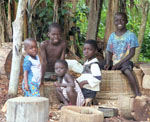|
Several MUSC faculty members,
residents, nurses, students and
others soon will be traveling to a
remote village in West Africa to
work with local Ghanaian nurses
and physicians.
This remote
village is home to 2,500 people,
1,400 of whom are children. The
group will be addressing the
primary health goals of the
village, including malaria testing
and surgeries for goiter,
hydrocele and vision problems. The
group is seeking donations to aid
in this Health Outreach trip to
Okurase in Ghana.
 The village
children are a big part of the
appeal for MUSC volunteers who
go to Okurase, Ghana. The village
children are a big part of the
appeal for MUSC volunteers who
go to Okurase, Ghana.
Cynthia Cupit
Swenson, Ph.D., is a professor in
MUSC's Family Services Research
Center, a part of MUSC's
Department of Psychiatry and
Behavioral Sciences, and is
involved with community-based
services and research. People
associated with Project Okurase in
Ghana have been at work for many
months organizing the Health
Outreach on the ground, she said.
Including the
15 people going from America,
there will be 75 volunteers in
all. The outreach will be led by
local Ghanaian physicians and
nurses. The Charleston group is
set to arrive to begin the
outreach on July 12.
"We are very
excited about this phenomenal
event and our partnership with
Ghana. We hope that this is the
start of a more formal arrangement
for future rotations and
internships for MUSC students and
residents."
Swenson said
despite the strengths and work
ethic of the people, this village
has no clean water, lack of proper
sanitation, limited medical care
or educational opportunities,
malnutrition and food security
issues (see photo exhibit on
second floor of the Colbert
Education Center & Library).
Sarah Logan, a
student going on the trip,
established a project to accept
donations at MUSC. Donation boxes
are located in the lobbies of the
Basic Science Building, the
library, the University Hospital
and the Children's Hospital, the
Wellness Center, the Cannon Street
building, Ashley River Towers,
McClennan Banks 1st floor and
Harborview Towers.
Organizers are
asking for donations of any of the
following non-expired supplies:
scrubs, exam/patient gowns,
surgical tools, otoscopes,
ophthalmoscopes, stethoscopes,
skin calipers, scales, gloves,
glucometers, glucose strips,
school supplies, and batteries.
Tax-deductible
monetary donations also are needed
to buy medications and malaria
testing kits in Ghana. Contact Dr.
Swenson, MUSC Department of
Psychiatry, 4th floor, McClennan
Banks, 843-876-1802;
swensocc@musc.edu or mail to:
PROJECT OKURASE,
2449 Beacon
Street,
North Charleston, S.C.
29405.
What
Will Be Happening?
- Screening,
treatment and surgeries (1,350
people were seen in 2011)
- Children's
camp, organized locally by
Charleston students, that
includes English, science and
other educational activities,
as well as soccer and songs
- Piloting
telemedicine for health
consults
- Piloting
the use of technology for an
electronic classroom where
village students can join
classrooms at a local high
school in Charleston
- Collecting
information for the website
and public relations
- Under
the direction of a medical
coordinator from MUSC, Eve
Spratt, M.D., collecting
information for the background
of grant applications (health,
nutrition, sanitation, water)
- Helping
with building of the
educational center, the Nkabom
Centre
- Health
education to be shared with
people waiting to be seen
- Partnering
with Water Missions
International to conduct a
site assessment to determine
water needs
- The opening
of a women's new small business
in gari production (a roasted
cassava root)
|



 The village
children are a big part of the
appeal for MUSC volunteers who
go to Okurase, Ghana.
The village
children are a big part of the
appeal for MUSC volunteers who
go to Okurase, Ghana.